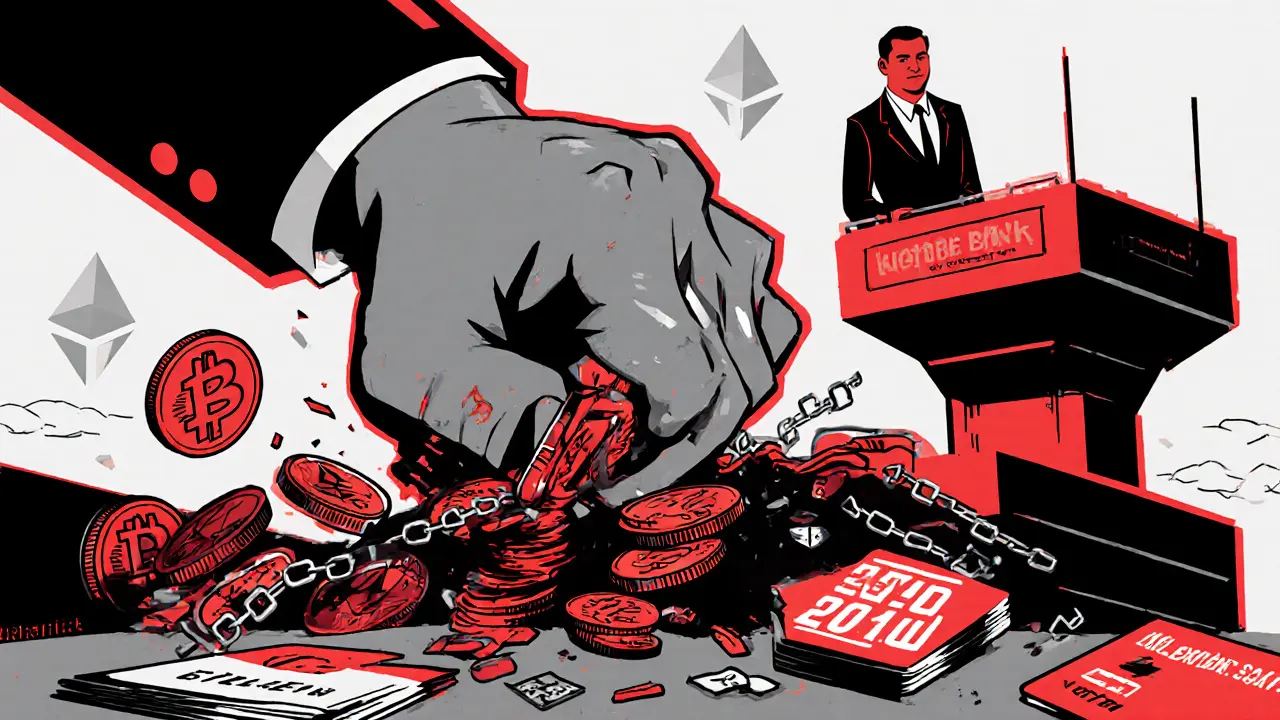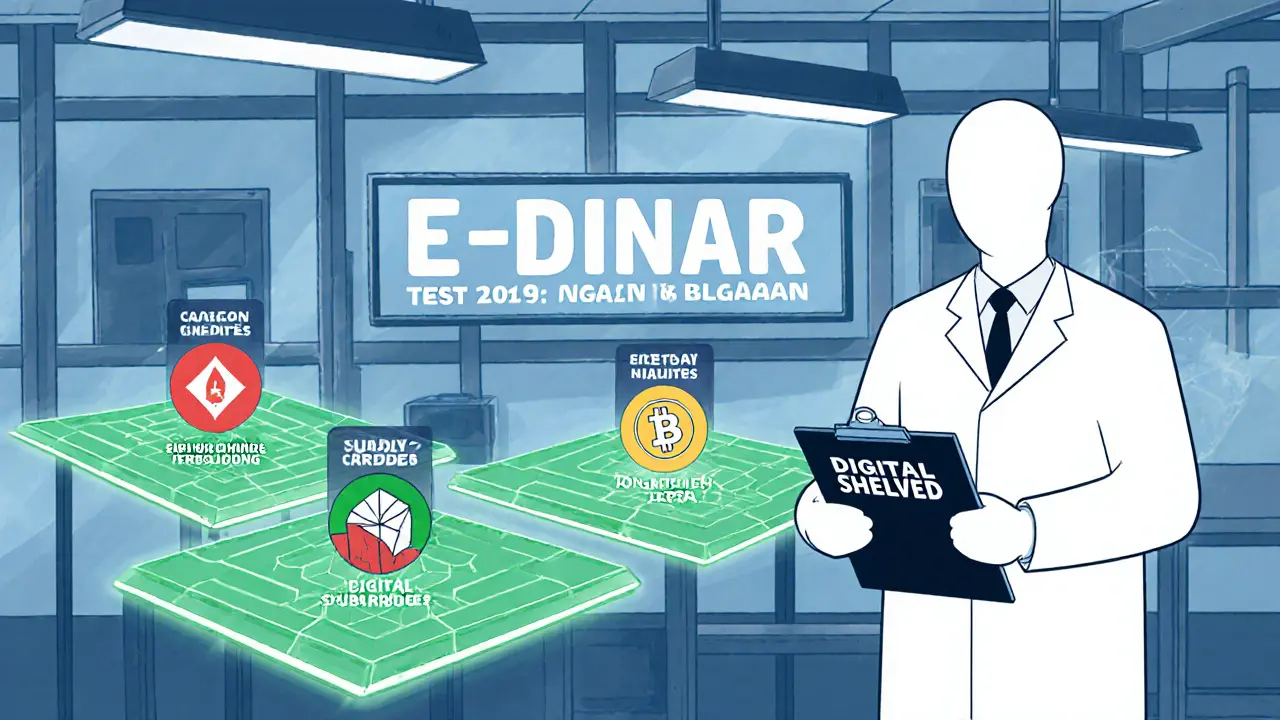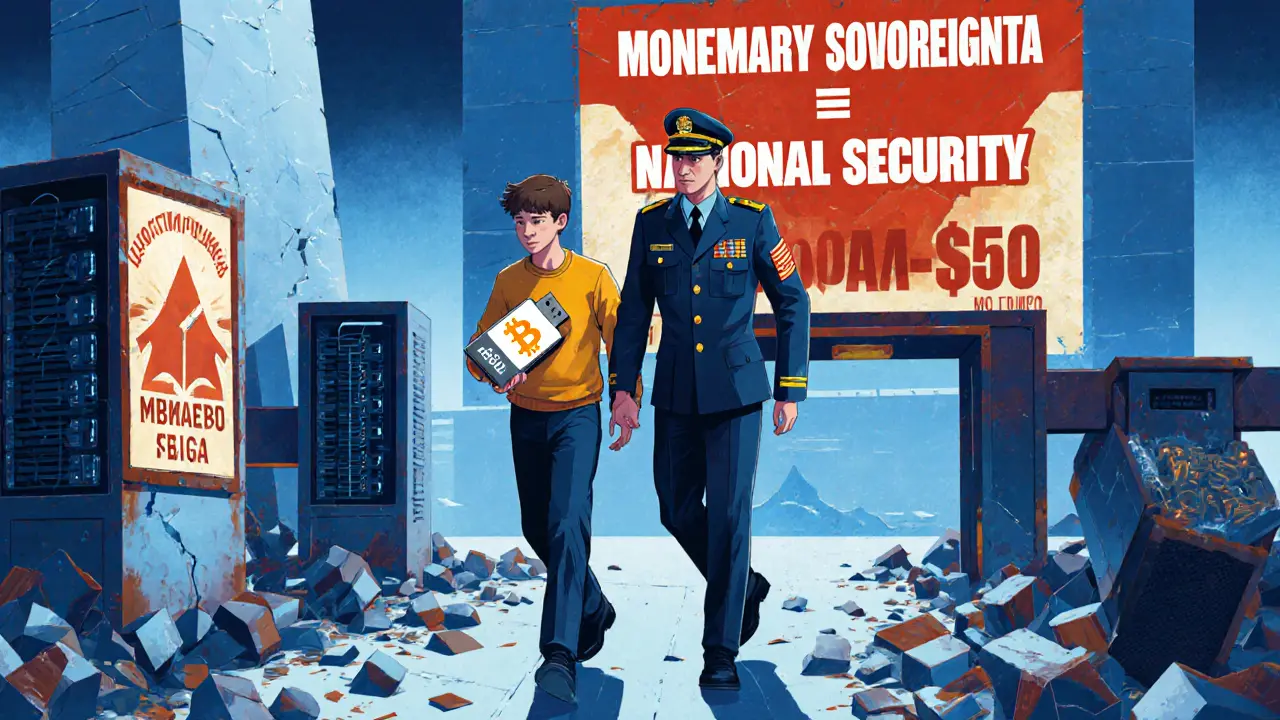Central Bank of Tunisia Crypto Policy: Complete Ban and Controlled Blockchain Experiments
 Aug, 17 2025
Aug, 17 2025
Tunisia Crypto Risk Assessment Tool
Tunisia's Crypto Ban Facts
Since May 2018, the Central Bank of Tunisia has banned all cryptocurrency transactions. Violations can result in up to 5 years in prison and heavy fines. Banks block payments to exchanges, customs seize mining equipment, and police have arrested people for small crypto trades.
Tunisia has one of the strictest cryptocurrency policies in the world. Since May 2018, the Central Bank of Tunisia has banned all cryptocurrency transactions - no buying, selling, mining, or using Bitcoin, Ethereum, or any other digital asset as payment. It’s not just discouraged. It’s illegal. Violators can face up to five years in prison and heavy fines. This isn’t a gray area. Banks block card payments to foreign exchanges. Customs seizes mining rigs at the border. Even holding crypto can get you in trouble.
Why Did Tunisia Ban Crypto So Hard?
The ban didn’t come out of nowhere. Between 2013 and 2017, Tunisia had no clear rules. People traded Bitcoin through WhatsApp and Facebook groups. No oversight. No taxes. No accountability. That chaos worried the government. They saw people moving money out of the country, bypassing currency controls. Capital flight was a real threat to Tunisia’s fragile economy. The Central Bank of Tunisia (BCT) acted fast - not to stop innovation, but to stop what they saw as financial risk. The 2018 directive wasn’t just about Bitcoin. It covered everything: exchanges, mining, trading, even advertising crypto services. If you’re in Tunisia and you try to buy crypto on Binance or Coinbase using your Tunisian dinar card, your bank will block it. If you import an ASIC miner, customs will confiscate it. If you run a crypto exchange from your apartment, you’re breaking the law.Who Enforces This Ban?
The BCT leads the charge, but they’re not alone. The Ministry of ICT & Digital Economy and the Financial Market Council (CMF) are also involved. The CMF would normally regulate tokenized assets - like stocks or bonds on a blockchain - but right now, those don’t exist legally in Tunisia. Enforcement is hands-on. Customs officers check packages. Banks monitor transactions. Police have arrested people for small crypto trades. In 2021, a teenager was jailed for exchanging $50 worth of Bitcoin. That case made headlines. It sparked debates in the cabinet. Some officials asked: Is this really the right way to handle technology? But nothing changed. The ban stayed. The message was clear: no exceptions.But Tunisia Isn’t Anti-Technology - Just Anti-Crypto
Here’s the twist: Tunisia doesn’t hate blockchain. In fact, they’re actively testing it - but only under tight control. Since 2020, the BCT has run a regulatory sandbox. Think of it as a legal test lab. A few fintech startups get permission to build blockchain-based tools - but only if they don’t touch real crypto. No Bitcoin. No tokens. Just permissioned ledgers. Companies like VFunder (for crowdfunding), Hydro E-Blocks (for carbon credit tracking), and No Phobos (AI-generated NFTs) have joined. But here’s the catch: they host their servers outside Tunisia. They use the sandbox to prove their tech works, then launch globally. They can’t offer crypto services inside the country. They can’t let Tunisians buy into their platforms. The sandbox isn’t a loophole - it’s a controlled experiment. This is part of the Digital Tunisia 2025 plan. The government wants blockchain for land registries, subsidy payments, and supply chain tracking - but only on private, government-approved systems. No public blockchains. No decentralization. Just digital ledgers they control.
What About CBDCs? Tunisia Tried One
In 2019, the BCT briefly explored launching its own digital currency - the E-Dinar. It was a proof-of-concept. No public rollout. No wallets. No trading. Just a test to see if a central bank digital currency (CBDC) could work. The project was quietly shelved. Why? No official reason. But experts believe the BCT realized that even a government digital currency could open doors to crypto adoption. They didn’t want to risk it. That decision tells you everything. Tunisia doesn’t fear technology. They fear loss of control. A CBDC is something they can manage. Bitcoin? Not so much.How Does This Compare to the Rest of the World?
Tunisia is in a tiny club. Only a handful of countries have full crypto bans: China, Egypt, Algeria, Qatar, Morocco, Nepal, Bangladesh. Most others regulate - they tax, license exchanges, require KYC, or ban banks from dealing with crypto. Tunisia doesn’t even allow that. No middle ground. While companies like PayPal, Microsoft, and Tesla accept crypto payments, Tunisia’s banks won’t even let you buy a coffee with Bitcoin. The gap is widening. Tunisia is moving away from global financial trends, not toward them. Still, Tunisia stays engaged internationally. They’re part of the Financial Stability Board’s Middle East and North Africa group. That means they’re talking to Saudi Arabia, Egypt, and others about crypto risks and cross-border payments. But they’re not adopting any recommendations. They’re listening - but not changing.
What’s Next for Tunisia’s Crypto Policy?
The ban hasn’t budged since 2018. But the sandbox is still running. That’s the key. The BCT isn’t ignoring innovation - it’s containing it. They’re watching what works, what doesn’t, and how blockchain can serve state goals without threatening monetary control. Tunisia’s economy is under pressure. Foreign currency reserves are low. Government borrowing is rising. The central bank’s independence is being questioned. These factors make crypto even more dangerous in their eyes - it could accelerate capital flight. But they also make digital solutions tempting. If a blockchain-based subsidy system can cut fraud and save money, why not use it? The future likely won’t be full legalization. But it might be more flexibility. Maybe the sandbox expands. Maybe government agencies start using private blockchains for more services. Maybe penalties soften - if the political will changes. For now, though, if you’re in Tunisia, crypto is off-limits. The law is clear. The risks are high. And the Central Bank of Tunisia isn’t backing down.What If You’re a Tunisian Citizen Using Crypto?
If you’re holding Bitcoin, trading on Binance, or mining with a rig you brought in - you’re breaking the law. The chances of getting caught aren’t high for casual users. But they’re not zero. Customs scans packages. Banks flag suspicious transfers. Police have arrested people before. Your best move? Avoid it. Don’t risk jail or fines. If you want to use blockchain tech, wait. The sandbox might open doors later. But right now, the only safe path is compliance.What If You’re a Business Trying to Operate in Tunisia?
Don’t build a crypto exchange. Don’t accept crypto payments. Don’t market crypto services. Even if you’re based overseas, if Tunisians can access your platform, you’re still violating the law. Many startups avoid Tunisia entirely for this reason. Your alternative? Use the sandbox. Apply to test a blockchain solution that doesn’t involve crypto assets. Focus on supply chain tracking, digital identity, or public service automation. That’s where the government wants innovation - and where you might find a legal path forward.Is cryptocurrency illegal in Tunisia?
Yes. Since May 2018, the Central Bank of Tunisia has banned all cryptocurrency transactions, including buying, selling, mining, and using digital assets as payment. Violations can lead to prison time and heavy fines.
Can I mine Bitcoin in Tunisia?
No. Importing cryptocurrency mining equipment like ASIC rigs is illegal. Customs authorities actively seize such devices at borders. Even if you already own mining hardware, using it to mine and convert coins into Tunisian dinar violates the 2018 ban.
Does Tunisia allow any form of blockchain technology?
Yes - but only under strict control. The Central Bank of Tunisia runs a regulatory sandbox where approved fintech firms can test permissioned blockchain applications for things like supply chain tracking, carbon credits, and digital subsidies - as long as no real cryptocurrency is involved.
Has Tunisia ever considered legalizing crypto?
There have been discussions, especially after a teenager was jailed for a small crypto trade in 2021. Cabinet members debated decriminalization, but no policy changes followed. The government continues to prioritize monetary control over crypto adoption.
Can Tunisians use a Central Bank Digital Currency (CBDC)?
No. Tunisia tested a digital currency called the E-Dinar in 2019, but the project was shelved. There is no public CBDC in circulation, and the Central Bank has not announced plans to launch one.
What happens if I send crypto to someone in Tunisia?
Sending crypto to someone in Tunisia doesn’t make it legal for them to hold or use it. If they try to cash out into Tunisian dinar, they risk legal consequences. Banks and authorities monitor transactions linked to known crypto exchanges.
Are crypto exchanges blocked in Tunisia?
Yes. Tunisian banks are prohibited from processing payments to foreign crypto exchanges like Binance or Coinbase. Many users try to bypass this with peer-to-peer platforms or VPNs, but these methods remain legally risky.
Is Tunisia’s crypto ban unique in Africa?
Tunisia is one of the strictest in Africa. Only Algeria, Egypt, and Morocco have similar full bans. Most African countries regulate crypto rather than ban it outright - allowing exchanges, taxing gains, or requiring licenses.